Health Equity Division Newsletter - October 2025

In this newsletter:
Greetings from the Health Equity Strategy and Innovation Division
Message from the Director
CONNECT: Joint council event brings together leaders from across the state
STRENGTHEN: HEAL Council seeks new members this fall
AMPLIFY: Grantee spotlight: Morning Glory Montessori
Greetings from the Health Equity Strategy and Innovation Division
As the air becomes crisp and leaves turn across Minnesota, we’re reflecting on the quiet strength that carries us through change. Indeed, this year has brought immense changes for us at the Health Equity Division, at MDH, in our communities, and across our great country.
This fall, our focus is on resilience—the ability of individuals, communities, and systems to adapt, recover, and thrive in the face of challenges. As our director Odi writes in her reflection below, we are inspired by our councilmembers, grantees, and partners, who remind us that we have faced challenges before, and we will persevere again. Health equity work demands this same resilience and hope of each and every one of us.
In this issue, we highlight some of the people and programs that embody resilience, proving that progress is not just possible—it’s unstoppable.
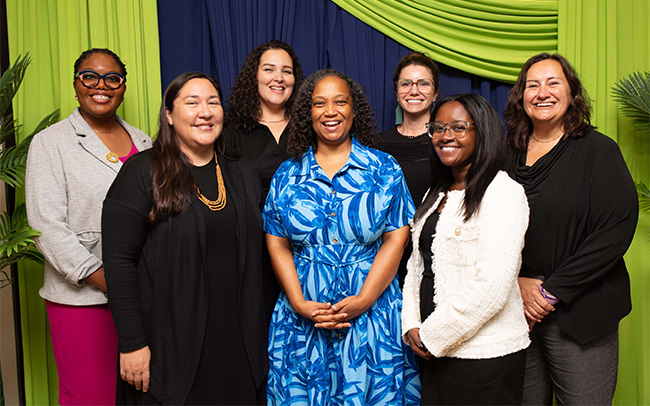
Pictured: Health Equity Bureau leaders pose with Commissioner Cunningham at the August Joint Council event. From left to right: Odi Akosionu-DeSouza, Oliviah Walker, Shalome Musigñac Jordán, Commissioner Brooke Cunningham, Christine Godwin, Aisha Ellis, Kris Rhodes.
[Interested in being a guest writer for a future newsletter? Email your idea to health.equity@state.mn.us and we will be in touch!]
Message from the director
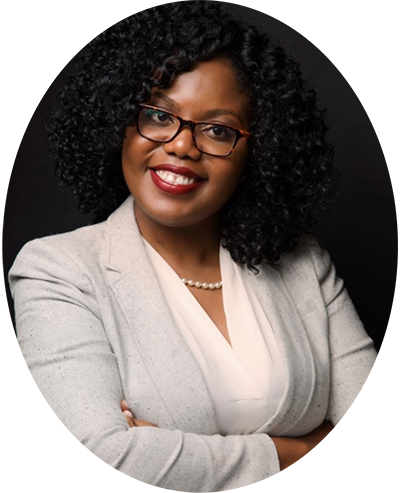
We are living through a time when equity work is under pressure. Resources are shrinking, funding is uncertain, and the path ahead is not always clear. Even so, we remain committed to this work. What keeps us grounded is the strength and resilience of our communities. That is why we continue to push forward: because we know what is at stake and who we are doing this work with and for.
This truth came through so clearly at our first Joint Council Event. Bringing together members from all three advisory councils for the first time was more than just a milestone. It was a moment that reminded us of our “why.” We do this work with and for our communities, and their voices guide us toward what matters most. The event also showed us the importance of building stronger connections between our councils and MDH so that their recommendations can drive actions that improve how we serve. We are committed to making this gathering a tradition, one that strengthens accountability and connection year after year.
This newsletter also points to other moments of perseverance and inspiration. The story on Morning Glory Montessori shows what is possible when community-led vision and determination take root, even against the odds.
I continue to be inspired by our councils, grantees, and partners who remind us that we have faced challenges before, and we will persevere again. Together, we are shaping strategies that not only protect the integrity of equity work but also prepare us for the long haul. Thank you for continuing to walk alongside us with courage and purpose.
Odichinma (Odi) Akosionu-DeSouza (she/her)
Division Director
CONNECT
We are a network hub – leading, connecting and strengthening networks of health equity leaders and partners across MDH and Minnesota communities.
First ever joint council event brings together leaders from across the state
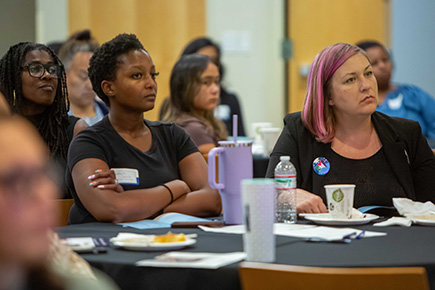
The Health Equity Bureau in August brought together members of its three community advisory councils for the first time ever for an afternoon filled with connection, reflection, and energy. Members of the Health Equity Advisory and Leadership (HEAL) Council, the African American Health State Advisory Council, and the Community Solutions Advisory Council came together at the Wilder Foundation in a “deliberate act of alignment and collaboration,” according to Commissioner of Health Dr. Brooke Cunningham.
“The challenges we face – from systemic racism to environmental threats – demand collaboration,” the commissioner shared in her opening remarks, emphasizing how critical this synergy is “break down silos between councils, communities, and the systems meant to serve them.”
The event included presentations from the Office of African American Health, the Office of American Indian Health, and the Office of Diversity, Inclusion, Belonging, and Equity Strategy, as well as time for relationship building among councilmembers and MDH staff. The afternoon concluded with a fireside chat with the chairs of each council hosted by MDH Policy and Systems Change Supervisor Blaire Rodenbiker, who spearheaded the planning of the event.
“The hope is that we leave stronger and ready to take care of business,” Rodenbiker shared as she kicked off the fireside chat.
The chat centered around councilmembers’ views on three key topics: the power and impact of community, health equity in action, and a collective vision for the future.
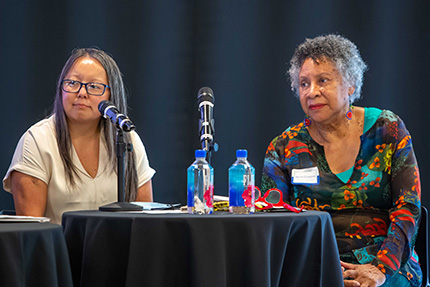
When discussing the power and impact of community, councilmembers shared poignant personal experiences that have shaped the way view community and their roles on the councils. The members’ backgrounds vary greatly, from growing up during segregation in Mississippi, to being raised by Hmong refugees on Saint Paul’s east side, to finding a sense of home in a thriving multicultural community at the University of Minnesota.
Through these diverse lenses, councilmembers shared what community means to them: Family. Responsibility. Purpose. Safety net. Different ways of knowing. Collective power.
“I’m here to take up space for my community [and] make sure my community is at the forefront, and not an afterthought,” shared Andrea Lawson, co-chair of the African American Health State Advisory Council.
Lawson co-chairs the newest of the three councils at the joint event, established during the 2023 state legislative session and launched in 2024. The council is charged with advising MDH on advancing equity for African American communities, specifically multigenerational African Americans or American descendants of slaves.
The HEAL Council is the longest running of the three, created in 2018 to amplify community voices and perspectives in the agency’s strategic and policy initiatives. It was codified in state statute in 2023, bringing formal recognition to the critical role the group plays in supporting and holding MDH accountable for advancing health equity.
A year after launching HEAL, the Community Solutions Advisory Council formed in 2019 to advise MDH on the Community Solutions for Healthy Child Development Grant program and other racial equity and early childhood grant efforts. It has become an effective model for co-developing and co-implementing a community-led grant program in partnership with community leaders.
By the end of the afternoon, the room was buzzing with energy and ideas for the future.
“The future is ambitious and absolutely possible because of the foundation we are laying,” Commissioner Cunningham shared. “You are not just advising; you are reimagining public health ... Keep pushing us to lead with integrity.”
The Health Equity Bureau envisions the event becoming an annual gathering that deepens and strengthens its connections with community partners. This year’s event was made possible through the leadership and collaboration of colleagues across the bureau.
To learn more about the Health Equity Bureau and the work of its advisory councils, visit the Health Equity webpage.
STRENGTHEN
We provide leadership in advancing health equity and cultivate health equity leaders within MDH and across Minnesota communities.
HEAL Council seeks new members this fall
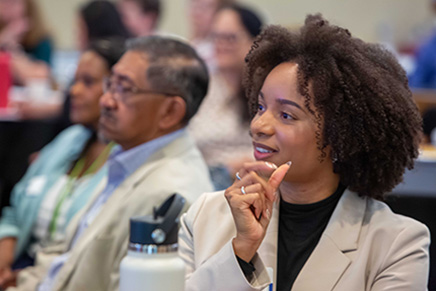
The Health Equity Advisory and Leadership (HEAL) Council will re-open to applicants this month as current councilmembers wind down their two-year terms. The application period for the 2026-2028 term will be open on the Secretary of State Boards & Commissions website for three weeks.
The HEAL Council was created as part of a broader effort by MDH to address Minnesota’s inequities in health status and was formally recognized in state statute in 2023 (Minnesota Statutes, section 145.987). The duties of the council are to:
- Advise the commissioner on health equity issues and the health equity priorities and concerns of the following populations:
- African American and African heritage communities
- Asian American and Pacific Islander communities
- Latino communities
- American Indian communities
- disability communities
- lesbian, gay, bisexual, transgender, and queer (LGBTQ) communities
- people who reside outside the seven-county metropolitan area
- Assist MDH in efforts to advance health equity, including consulting on specific agency policies and programs, providing ideas and input about potential budget and policy proposals, and recommending review of agency policies, standards, or procedures that may create or perpetuate health inequities.
- Assist MDH in developing and monitoring meaningful performance measures related to advancing health equity.
Applications from individuals with relevant skills and experience that reflect a strong commitment to advancing health equity are welcome. Applicants are not required to identify with a specific community group to be considered. A variety of perspectives and experiences strengthen the council’s work and impact.
Learn more about the council on the HEAL Council webpage.
AMPLIFY
We amplify the work of communities most impacted by health inequities and support them to drive their own solutions.
“This is my justice imagination:” Grantee spotlight on Morning Glory Montessori
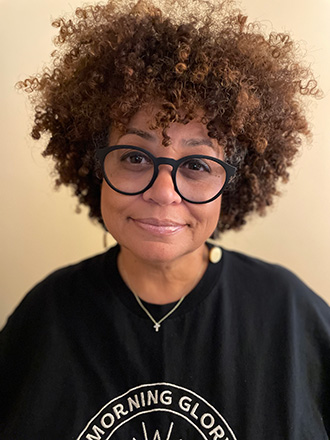
For Pastor Jessica L. Jackson, opening Morning Glory Montessori™ was more than launching a school; it was fulfilling “a sacred mission.”
As the founder and head of the school, she wears many hats: lead guide in the classroom, community builder, partnership developer, and even construction project manager during building renovations. But at the heart of her work is a vision planted decades ago through her family’s deep roots in education.
“My mother was the first early childhood educator in our family and a trailblazer in this community [of North Minneapolis],” Pastor Jessica said. “The vision that was put in my heart came from her.”
Her path to Montessori education was unexpected. Though she was introduced to the model more than 30 years earlier, Jessica initially pursued a career in law. Years later, she was reintroduced to the Montessori model by a teacher from Florida during a community brainstorming session on starting a school. That conversation, along with encouragement from the Montessori Center of Minnesota’s founder, led Jessica to enroll in a rigorous and transformative training on the Montessori model for early childhood education.
“It was harder than law school,” she said. “It was holistic, healing, emotional, and intellectually challenging.”
Today, Morning Glory Montessori focuses on culturally rooted education for Black boys, aiming to disrupt the school-to-prison pipeline. Jessica cites research on the “adultification” of Black boys, often beginning in preschool, as part of her motivation.
“We knew we were taking on one of the hardest cases,” she said. “But if we can make a difference early, we can give them a strong foundation.”
The road to opening the school was long and challenging. It took seven years to find and prepare a suitable facility, with setbacks ranging from licensing delays to costly building upgrades to ensure regulatory compliance. Unfortunately, many families who planned to enroll their children in the school saw them age out during the wait.
Even so, community support remained strong. Pastor Jessica launched the “Blacks, Believers, and the Montessori Way” campaign to raise awareness and debunk myths about Montessori education in Black communities. The school’s board is made up entirely of African American members, and local and national partners have provided both funding and training opportunities.
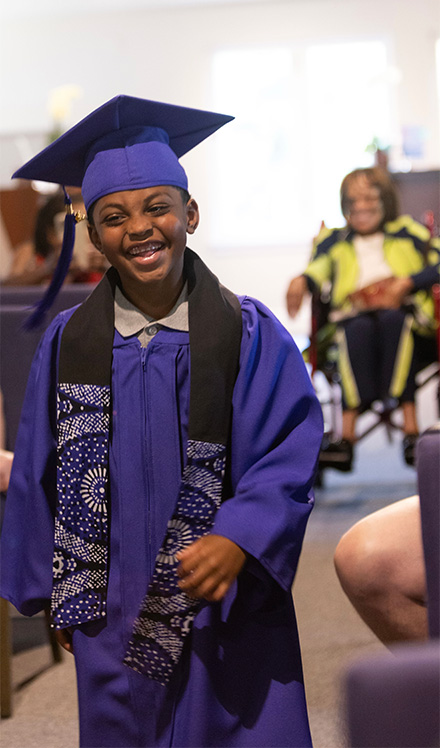
With the help of her co-founders, Patricia Crumley and Rev. Dr. Timothy Jackson, Morning Glory Montessori officially opened in 2024 and launched their first graduate in June of 2025 – a moment Pastor Jessica calls her proudest achievement.
“He’s going to kindergarten assessing seven points above the standard,” she said. “He remembers the songs and affirmations we taught him. That’s going to carry him forward.”
Jessica believes the school’s impact reaches beyond its walls. Morning Glory is the only Montessori school in the country that is both faith-infused, Afrocentric, and designed specifically for boys. Families, educators, and advocates across the nation have taken notice.
“Parents are seeing there are other ways to educate our children,” she said. “It stirs up hope and possibilities.”
Looking ahead, Jessica hopes to expand enrollment to eventually include girls and develop before- and after-care options to improve accessibility for families. Expanding transportation opportunities and offering summer programming are also priorities.
Her vision for growth includes creating training pathways for more Montessori educators within the community, including elders, and adapting international models to make training more accessible.
“We need sustainable solutions from within our communities,” Pastor Jessica shared. “This is my justice imagination.”
She added that support from the Minnesota Department of Health’s Community Solutions for Healthy Child Development grant has been crucial during the school’s early years.
“We couldn’t have done it without this grant, not in the way we have,” Jessica said. “It helped us stand on our own feet and show that our community wisdom has value.”
Despite the obstacles, Jessica is confident that Morning Glory Montessori’s work will continue to grow.
“We are helping little boys joyfully and holistically grow into confident, competent contributors to the community,” she said. “That's a blessing for everyone.”
Learn more on Morning Glory Montessori’s website.